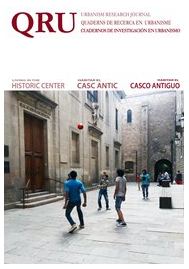Barcelona no tiene vacaciones: análisis del turismo urbano en Barcelona y su interacción con las medidas implementadas en el Raval
DOI:
https://doi.org/10.5821/qru.9611Abstract
Tourism is a global phenomenon studied and discussed among others by economists, geographers, urban planners, anthropologists, and sociologist, due to its considerable repercussions in the economy of a country or a city in its urban development or in its citizen’s life. The recent and extensive growth all over the world has turned it into an essential object of study, that requires new tools, that may improve, for example, the relationship between residents and tourists. The importance of the impact of urban tourism over a city like Barcelona is extremely interesting, particularly on its most stressed area: the city center concretely The Raval. This neighborhood suffered considerable modifications through time, specially over the last decades. analyzing impacts, sectorial measures and physical interventions. The historical and urban background of this neighborhood considered it as a privileged urban laboratory. Our study starts from a pre-Olympic Barcelona, where the work of renovation of Barcelona’s image is the base of what the city still promotes.Downloads
Issue
Section
License
Those authors who have publications with this journal, accept the following terms:
a. Authors will retain their copyright and guarantee the journal the right of first publication of their work, which will be simultaneously subject to the Creative Commons CC BY-NC-ND-4.0 recognition license that allows third parties to share the work provided that its author and its first publication are indicated in this journal, but they cannot be changed or used commercially.
b. Authors may adopt other non-exclusive license agreements for the distribution of the version of the published work (eg: deposit it in an institutional telematic archive or publish it in a monographic volume) provided that the initial publication in this journal is indicated.
c. Authors are allowed and recommended to disseminate their work through the Internet (e.g. in institutional telematic files or on their website) before and during the submission process, which can lead to interesting exchanges and increase citations. of the published work. (See The effect of open access).













